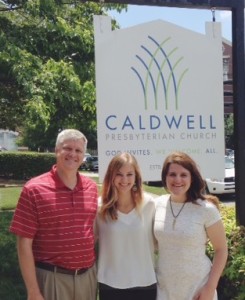Dear Caldwell,
One of the books I am reading before my second round of intensive doctorate-in-ministry classes in June is by one of the great Old Testament scholars, Dr. Walter Brueggemann of Columbia Theological Seminary in Atlanta. It’s titled The Practice of Prophetic Imagination: Preaching An Emancipated Word. As we travel from Sunday to Sunday this week, I thought I might share a taste of it.
Brueggemann writes: “The prophetic task is to mediate a relinquishment of a world that is gone and a reception of a world that is being given.” (author’s italics)

In a sense, we all have a calling to be prophets, to speak God’s truth into difficult situations, even if the title prophet feels awkward, scary or even undesired. Prophets, Brueggemann writes, help shake God’s people out of denial over what has been lost. Prophets help people name what has been lost. They speak God’s assurance to help us relinquish, let go of, what is lost so we can make room to receive what is new.
The Old Testament prophets kept busy helping Israel get over its denial of their loss and let go of what was past. We encounter the same in our own lives, don’t we? Relationships, jobs, circumstances, money, our health can all come and go. The prophets remind us that God is with us in our loss, but also calling us forward to what is next.
What might a prophet speak to in our times as a nation? Brueggemann offers this:
In our own time, the denial of what must be relinquished among us is everywhere around us. The political mantra “Take back our country” is a desperate yearning not just for small government but for a safe, white, straight world from which the disruptive “others” – gays, Muslims, immigrants – are banished.
That “safe, white, straight” world is indeed past. But there are plenty of public figures who aren’t ready to relinquish. Brueggemann’s words foreshadow what awaits us in the coming political season and presidential election. As the field of candidates grows almost by the day, we may feel a knot form in our stomach as we anticipate all the accusations, mud-slinging, name-calling and dirty tricks that are to come.
But, even in the midst of all of that, Brueggemann reminds us that we have a calling. As people who put faith in a God that is neither Democrat or Republican, he reminds us to stay focused on the work of building the kingdom of God on earth, a kingdom that transcends and outlasts whatever administration comes next. Such a kingdom is a gift to be received. He writes, “(Another) task of contemporary prophetic ministry is to enable and empower folk to receive a new world that is emerging before our very eyes that we confess to be a gift of God.”
That is a good word for all who would seek to be prophets, in small or large ways, with words, or actions or simply by bearing witness, bringing reminders of God’s will to an often cynical and bitter world.
Now, if we can only slow down, be quiet and receive it.
In Christ,
John
